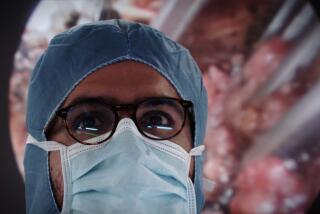Kept Alive by a Heart That Whirs
- Share via
After more than seven weeks of secrecy, an intensely curious world finally got a glimpse Tuesday of the first recipient of a totally enclosed artificial heart--and a hint of what it is like to live with a metal and plastic organ distinctly different from the flesh-and-blood heart it replaced.
“The biggest thing is getting used to not having a heartbeat, except here I have a whirring sound,” said 59-year-old Robert L. Tools. “And that makes me realize I am alive because I can hear it without a stethoscope.”
The new heart is heavier than the old heart, he said. “I’m still getting used to it.”
The video link from the office of one of Tools’ surgeons showed the world a frail and still painfully thin African American man dressed in blue shirt and red tie who spoke quietly and with visible effort. As he talked, he raised his right hand to the knot of his tie, covering a hole in his windpipe, where, until recently, a tube ran to help him breathe.
It was the first look the world has had of the heart recipient. Until Monday, even his name was a secret. Hospital officials and the maker of the heart took extraordinary steps to shield his identity--and, perhaps, to limit the risk of bad publicity had the heart failed to work properly.
Remarkably for a man who was considered near death just a few weeks ago and who is the test subject in an extraordinary medical experiment, doctors now say Tools may be able to go home if he continues to gain strength and weight.
Originally, the surgeons had said they would be pleased if their patient lived a month. Now, said Dr. Robert Dowling, one of the surgeons who implanted the artificial heart, Tools could even resume a reasonably active life, including the fishing that he loves.
“I think when he gets his strength back, the heart, the device, will allow him to do whatever he wants,” Dowling said.
“I think we’ve taken somebody who’s been the sickest you could get and really gotten him now back into a very healthy situation,” said Tools’ other lead surgeon, Dr. Laman Gray.
Tools could still be eligible for a heart transplant at a future date--maybe a minimum of four to six months--when his health has improved, Gray said.
Deciding to have his own heart replaced by an artificial organ that had never been tested in a person was not a difficult choice, said Tools, a retiree who lives in Franklin, Ky. He is married and the father of two adult children.
His own heart had failed, he knew, and he had been told he had only a few weeks left to live.
“There was no decision to make, really,” he said. “I mean I have a choice: I can sit at home and die or come here and take a chance. I decided to come here and take a chance, and my family went along with me.”
In 1992, Tools had two heart attacks followed by quadruple bypass surgery. By 1995, he had congestive heart failure and diabetes. He was ineligible for a heart transplant because of his extremely poor health.
Then, on June 20, his cardiologist showed him a magazine article about a new artificial heart, called the AbioCor, which was shortly to begin clinical trials at five sites in the United States. On June 26, Tools journeyed to one of those sites, Jewish Hospital in Louisville, to be evaluated for participation in the trial.
Surgeons at the hospital decided that Tools met the rules for the trial--primarily that he was too ill for a transplant and not expected to live more than 30 days without one. On July 2, they removed his heart and replaced it with the AbioCor.
Since then, heart doctors say that despite some problems--including bleeding in the stomach and a lung infection--they have been encouraged by how well Tools has been doing.
Before the operation, Tools was so sick that he could walk only 10 to 15 feet unassisted. His weight had dropped from 200 pounds to 140. His kidney and liver were in failure and his blood albumin--a measure of overall body function--was very low.
Today, Tools can walk far longer distances unassisted, and his kidney and liver function are effectively normal, said Gray and Dowling, the University of Louisville surgeons who lead the artificial heart team at Jewish Hospital/University of Louisville. His albumin levels are much improved, and he is breathing normally after weeks of assistance.
The AbioCor heart, developed by a Massachusetts company called Abiomed with help from federal funds, consists of a 2-pound heart implanted in the chest cavity, a rechargeable internal battery and electronics implanted elsewhere in the body. The battery is recharged through the skin surface so there are no protruding wires or lines. That makes the new heart far less cumbersome--and less likely to lead to infections--than earlier artificial hearts such as the Jarvik-7.
The artificial device could help deal with a huge gap between the need for heart transplants and the supply of organs. It is estimated that as many as 100,000 Americans a year could benefit from a heart transplant. Only about 2,400 hearts are available each year.
“I think it’s a very important milestone--we’re very encouraged so far,” said Dr. Hillel Laks, chief of cardiac surgery at UCLA and principal investigator for the artificial heart program there. The university is one of the five sites approved for clinical trials.
One of the major concerns with artificial devices of this type, Laks said, is the risk of blood clots and strokes. Tools has not had those, he said.
“We’ve said all along that we don’t just want to put this in and prove the concept,” said Dowling, “but also get the patient to where he has a good quality of life.”






